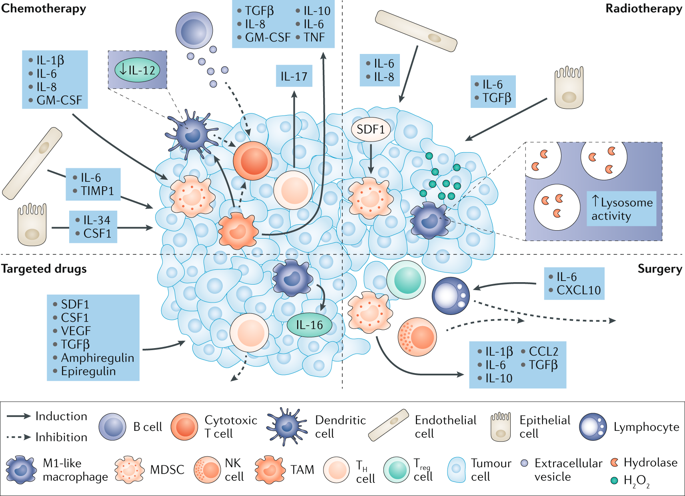当前位置:
X-MOL 学术
›
Nat. Rev. Cancer
›
论文详情
Our official English website, www.x-mol.net, welcomes your
feedback! (Note: you will need to create a separate account there.)
The pro-tumorigenic host response to cancer therapies.
Nature Reviews Cancer ( IF 72.5 ) Pub Date : 2019-10-23 , DOI: 10.1038/s41568-019-0209-6 Yuval Shaked 1
Nature Reviews Cancer ( IF 72.5 ) Pub Date : 2019-10-23 , DOI: 10.1038/s41568-019-0209-6 Yuval Shaked 1
Affiliation

|
Resistance to cancer therapy remains a major challenge in clinical oncology. Although the initial treatment phase is often successful, eventual resistance, characterized by tumour relapse or spread, is discouraging. The majority of studies devoted to investigating the basis of resistance have focused on tumour-related changes that contribute to therapy resistance and tumour aggressiveness. However, over the last decade, the diverse roles of various host cells in promoting therapy resistance have become more appreciated. A growing body of evidence demonstrates that cancer therapy can induce host-mediated local and systemic responses, many of which shift the delicate balance within the tumour microenvironment, ultimately facilitating or supporting tumour progression. In this Review, recent advances in understanding how the host response to different cancer therapies may promote therapy resistance are discussed, with a focus on therapy-induced immunological, angiogenic and metastatic effects. Also summarized is the potential of evaluating the host response to cancer therapy in an era of precision medicine in oncology.
中文翻译:

促肿瘤宿主对癌症治疗的反应。
对癌症治疗的耐药性仍然是临床肿瘤学的主要挑战。尽管最初的治疗阶段通常是成功的,但以肿瘤复发或扩散为特征的最终耐药性令人沮丧。大多数致力于研究耐药性基础的研究都集中在与肿瘤相关的变化上,这些变化有助于治疗耐药性和肿瘤侵袭性。然而,在过去的十年中,各种宿主细胞在促进治疗抗性方面的不同作用已得到更多的认可。越来越多的证据表明,癌症治疗可以诱导宿主介导的局部和全身反应,其中许多会改变肿瘤微环境中的微妙平衡,最终促进或支持肿瘤进展。在这篇评论中,讨论了了解宿主对不同癌症治疗的反应如何促进治疗抵抗方面的最新进展,重点是治疗诱导的免疫学、血管生成和转移效应。还总结了在肿瘤学精准医学时代评估宿主对癌症治疗的反应的潜力。
更新日期:2019-10-23
中文翻译:

促肿瘤宿主对癌症治疗的反应。
对癌症治疗的耐药性仍然是临床肿瘤学的主要挑战。尽管最初的治疗阶段通常是成功的,但以肿瘤复发或扩散为特征的最终耐药性令人沮丧。大多数致力于研究耐药性基础的研究都集中在与肿瘤相关的变化上,这些变化有助于治疗耐药性和肿瘤侵袭性。然而,在过去的十年中,各种宿主细胞在促进治疗抗性方面的不同作用已得到更多的认可。越来越多的证据表明,癌症治疗可以诱导宿主介导的局部和全身反应,其中许多会改变肿瘤微环境中的微妙平衡,最终促进或支持肿瘤进展。在这篇评论中,讨论了了解宿主对不同癌症治疗的反应如何促进治疗抵抗方面的最新进展,重点是治疗诱导的免疫学、血管生成和转移效应。还总结了在肿瘤学精准医学时代评估宿主对癌症治疗的反应的潜力。






























 京公网安备 11010802027423号
京公网安备 11010802027423号